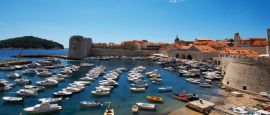Croatia History, Language and Culture
History of Croatia
Croatia has a long and eventful history. Although Greek colonies were present on its coast from around the 6th century BC, this was an Illyrian-dominated territory until Celtic tribes began to push them into modern-day Albania in the 4th century BC. The tough Illyrians managed to hold much of Croatia, however, until the Romans defeated the last Illyrian king in 168BC.
The Romans ultimately brought the whole Dalmatian coast under imperial control, going on to rule for some five centuries. They built roads, trading outposts and fortresses, including the grand palace in Split, the finest Roman ruin of its kind in Eastern Europe. Towards the end of the Roman era, there were two Dalmatian emperors, including the great Diocletian.
After the collapse of the Roman Empire, Croats alongside other Slavic tribes began to move westwards. In the 7th century they are thought to have attacked Byzantine Dalmatia with the help of the Avars. By the 8th century, powerful Croat clans in the region had emerged, and an independent Croatian state was established in the 10th century. It lasted less than 200 years. Over subsequent centuries, Croatia was alternately ruled by Hungary, Venice, Napoleon and Austria. After WWI, a new 'Kingdom of Serbs, Croats and Slovenes' was created, and following WWII, Croatia became part of Tito’s Yugoslavia along with Serbia, Slovenia, Bosnia, Macedonia.
On 25 June 1991, Croatia declared itself independent from Yugoslavia, a move that resulted in an infamously drawn-out conflict. Croatia was pitted against the might of the Yugoslav army and Serb irregular forces. In any case, by December 1991 the German government had recognised Croatian independence, with the rest of the world quickly following suit.
The death of the country's first democratically elected president, Franjo Tudjman, in 1999 heralded a new era of Croatian politics; Stjepan Mesić stepped into the fold and Croatia adopted a more conciliatory approach at home and abroad. In 2009, Jadranka Kosor became Croatia's first female prime minister following the surprise resignation of former PM, Ivo Sanader. In 2013, Croatia became a member of the European Union.
Did you know?
• The English poet Lord Byron once described Dubrovnik as the “pearl of the Adriatic”.
• While the old Slavic Glagolitic alphabet was replaced by Cyrillic in the Middle Ages, the Croats kept it alive until the 20th century – mostly in liturgical writing.
• Ancient Egyptians in Croatia? The sphinx seen in the Roman ruins of Split was brought over from Egypt by Diocletian in the 3rd century.




 You know where
You know where